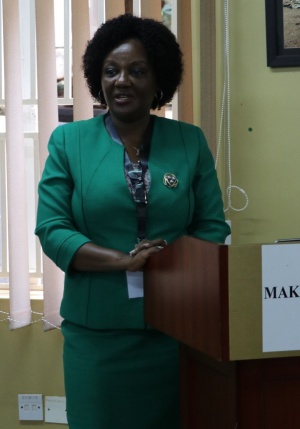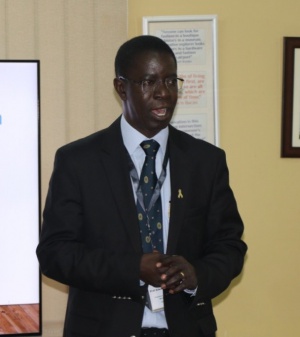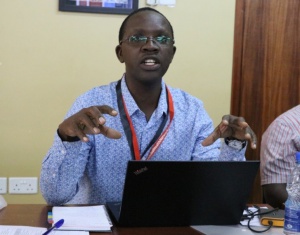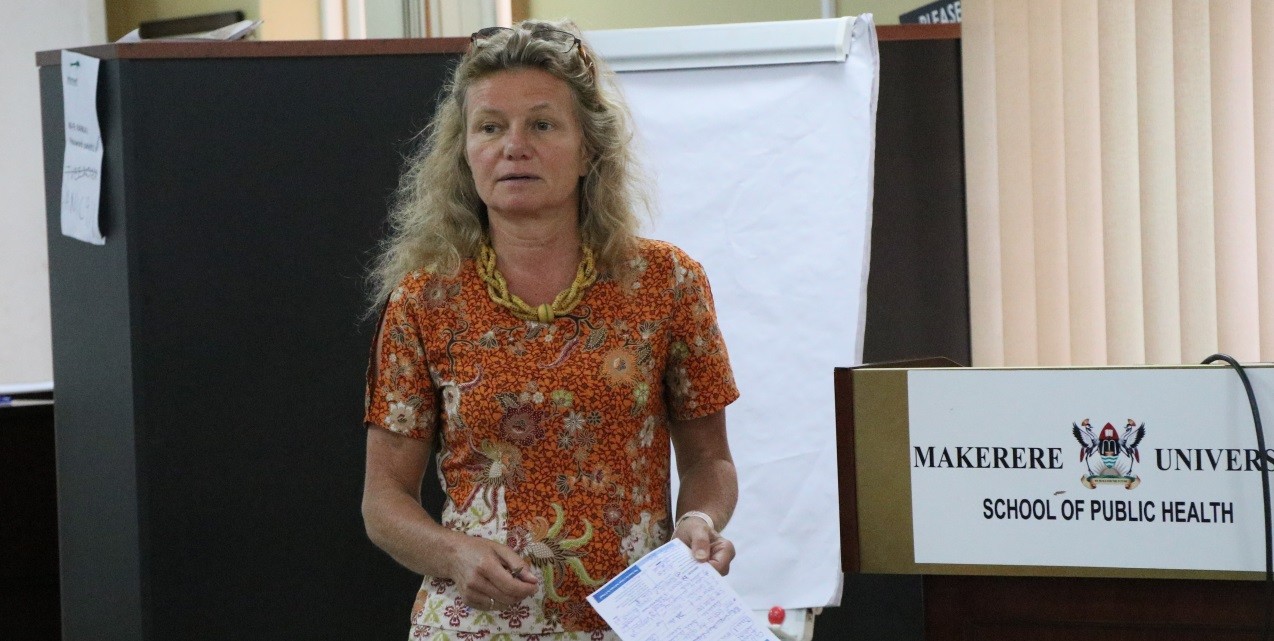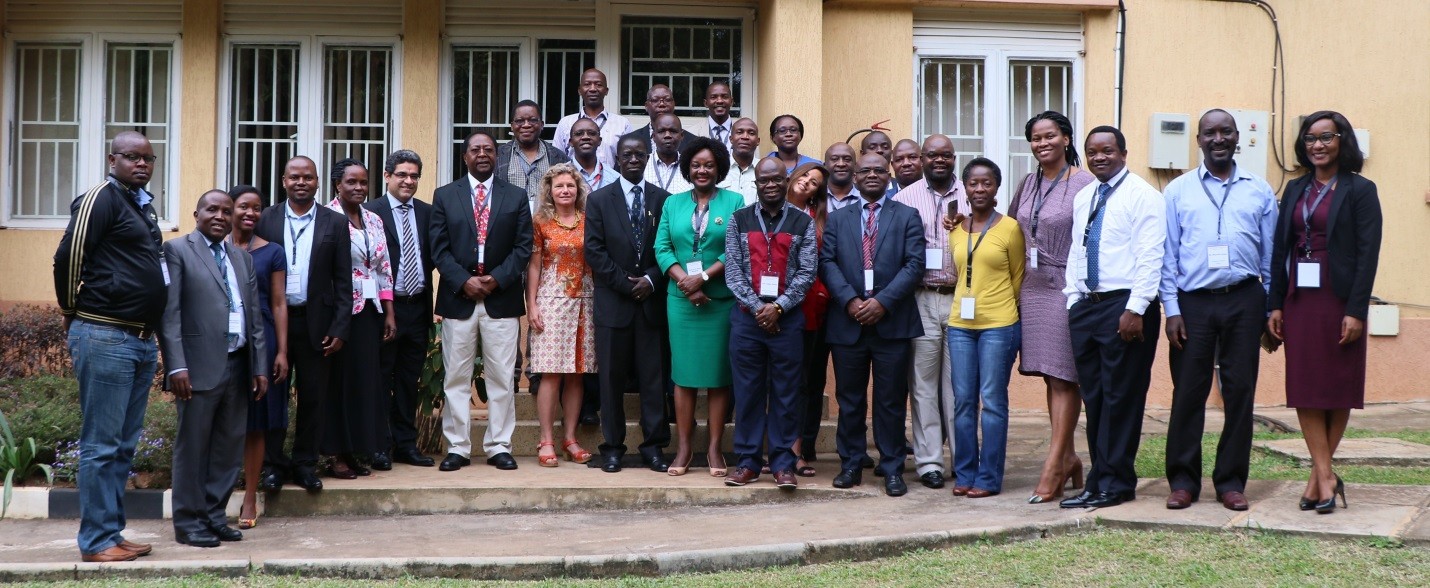
(Participants at the PERSuADE at the two-day inception meeting and project launch at MakSPH’s Resilience Africa Network offices in Kololo, Uganda.)
On August 21st and 22nd, 2018, Makerere University School of Public Health (MakSPH) held a two-day inception workshop that brought together six universities in Africa and the respective Ministries of Health from their countries to review and agree on the implementation approach for a Global Fund grant. This project grant aims at supporting Ministries of Health to review and analyze data at national and subnational levels for well-informed decision-making.
This grant comes after MakSPH together with these universities submitted a partnership proposal designed at enhancing technical support for analytical capacity and data use. The partner universities set to benefit from this grant together with MakSPH include the universities of Nairobi and Muhimbili in East Africa and Malawi, Zambia, Zimbabwe and Witwatersrand (Wits) in Southern Africa.
The face-to-face meeting that doubled as a project launch which was held at MakSPH premises at Resilience Africa (RAN) offices in Kololo was attended by officials from Global Fund and the World Health Organisation (WHO) country office.
Global Fund which required such data was
tough and a struggle but that GF has greatly
supported data gathering although a lot of
gaps still exist.
In addressing the participants at the launch, the Dr Rhoda Wanyenze (pictured below), Assoc Prof and the Dean of MakSPH, who is the lead Principal Investigator (PI) underscored the timely relevance of the project. She said; “Prioritizing interventions at the country level is needlessly complicated by the unavailability of data. Basic numbers of who is being served, by what intervention, who is being left behind, how many have been reached by particular interventions, in what region e.g. prevention interventions, HIV testing and counselling, circumcision, etc., have been hard to come by.”
Dr Wanyenze revealed that prior work with Global Fund which required such data was tough and a struggle but that GF has greatly supported data gathering although a lot of gaps still exist. She implored academia present to look beyond the academic nature of the exercise, adding that the project envisioned aiding decision-making for countries. She explained; “This is especially as we try to move towards epidemic control and elimination of HIV, TB and Malaria. We hope to work with the Ministries of Health closely to identify and respond to gaps and not duplicate what is already going on. Our underlying premise is that Ministries of Health take the lead and universities only come in to play a supportive role in key technical aspects of analysis; it is much easier as well, to pull together funders than if an individual is calling for assistance in plugging gaps in data analysis.”
Country Coordinating Mechanism (CCM)
In his opening remarks, Prof Edward Kirumira (pictured above), the Chairperson Country Coordinating Mechanism (CCM) thanked Global Fund for the support extended to the country in pursuing such programs.
“Because of my background in academia, I am very delighted at the prospect of having academia working closely with government in data analysis and use. I pledge my support for this project so that concept notes for a number of proposals can be improved for funding for program implementation purposes, and not just for promotional interests”, Prof Kirumira revealed
Dr Daniel Kyabayinze (pictured below) the Deputy Program Manager, National Malaria Control Program (NMCP) in the Ministry of Health raised some interest He also pointed out the need to harmonize research especially when data figures seem to differ from those by individuals from academia, given the fact that even Ministries of Health have research-inclined technical working groups. “Whose data counts?” queried Dr Kyabayinze. He was alluding to the need to have close relations between Ministries of Health’s technical working groups and academia in data dissemination, analysis and use.
Program Manager, National Malaria
Control Program (NMCP)
While appreciating the organizers of the meeting for making strides and progress even when finances were not yet released, the Global Fund Senior Manager, Monitoring and Evaluation and Continuity Agency (MECA), Nathalie Zorzi, appreciated Makerere and Witwatersrand universities for expressing trust in the Global Fund, by moving forward with preparations.
She commended the project management team for adhering to World Health Organization tools and guidelines. She revealed that a sizeable chunk of Global Fund money is channelled through grants.
“Routine data monitoring systems are a very important component for us as Global Fund, and we have seen massive improvements in health information systems in your region. But we have realized that you are sitting on a lot of un-analyzed data, which is not enough for improving decision-making, increased coverage, impact and efficiency”, she opined.
She also revealed that while the Global Fund was financing similar programs in other parts of Africa, the PERSuADE project was the most innovative and challenging, and generated a lot of excitement.
Zorzi (pictured above) urged partners present to focus on creating systems to build capacity, and having an approach that ensures data is being analysed so that institutionalized data analysis can facilitate improved policy decisions. She also pledged to work closely with country teams to facilitate the communication to make sure access to the grant is made easier. “We see a lot of potential for additional support and partnership and our dream is to mix financial supply chain and program activity data to continuously make sure people know what they are doing”, she concluded.
Participants at the PERSuADE at the two-day inception meeting and project launch at MakSPH’s Resilience Africa Network offices in Kololo, Uganda.
The meeting ended on Wednesday, August 22nd, 2018 with the coining of the PERSuADE phrase which stands for PartnERShip to enhance Analytical capacity and Data use in East and Southern Africa
Project Objectives
• Support national programs with key disease-specific analyses in HIV/AIDS, TB, and Malaria on a regular basis, and use of the results to improve programs e.g. coverage, quality, efficiency and impact
• Support national institutional capacity for analysis and use of data available from multiple sources, including financial, human resources, health products, as well as resource allocation models
• Enhance analytical capacity by supporting countries in institutionalizing regular data reviews and analysis at national and sub-national levels
Principal Investigator: Prof Rhoda Wanyenze, MakSPH. Co-Principal Investigators are Prof Fred Wabwire – Mangen (MakSPH) and Prof Tobias Chirwa (Witwatersrand University School of Public Health).
Supported Countries and Lead persons at the institutions
• Uganda; Dr Simon Kasasa, MakSPH; overall lead, and support centre for the East African universities
• Tanzania; Dr Rose Mpembeni, Muhimbili University School of Health and Allied Sciences (MUHAS)
• Kenya; Prof Mutuku Mwanthi, University of Nairobi School of Public Health
• Zambia; University of Zambia School of Public Health
• Zimbabwe; Prof. Mufuta Tshimanga, University of Zimbabwe College of Health Sciences
• Malawi; Dr Jupiter Simbeye, University of Malawi School of Public Health and Family Medicine
• South Africa; Prof. Tobias Chirwa, Witwatersrand University School of Public Health, Support centre for the Southern Africa contingent.
The Inception phase is expected to end by October 31st 2018 on submission of a consolidated report.


